
views
X
Research source
If you feel like you are an easy target in your social circle, you must abandon this role in order to enjoy greater emotional health. Start by addressing any guilt you feel. Then, work to improve your self-worth. Finally, take measures to build stronger, less toxic relationships.
Building Your Self-Worth
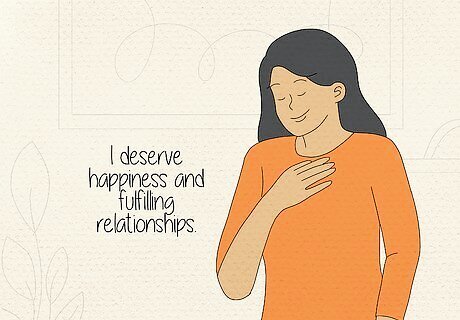
Stop negative self-talk. If you are often marked as a scapegoat, your self-talk may be belittling and unhelpful. You may catch yourself repeating internally the same claims others make about you. Boost your self-esteem by shifting your thoughts in a more positive direction. Spot negative thoughts and learn to reframe them. For example, you may have come to believe, “I don’t deserve happiness.” Rephrase this positively by saying, “I deserve happiness and fulfilling relationships.” Pay attention to how you talk about yourself. You may even want to ask friends and family members to point out when you are speaking negatively about yourself. This will help you to notice the negative self-talk and correct it when it happens. If you are facing a negative event or situation, try to see them as a way to learn and grow. Ask yourself why the situation is negative, what can be changed, and how you can begin taking steps in a different direction.
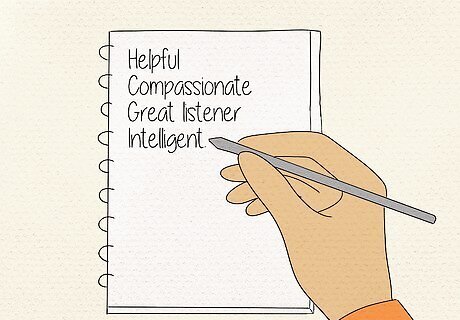
Focus on your positive traits. If you are an easy mark for scapegoating, you may have developed the tendency of dwelling on the negatives. Start bringing your attention to the positive strengths you have to offer the world around you. Make a list of good qualities, such as “helpful,” “compassionate,” “great listener,” and “intelligent.” Pull out your list when you find yourself playing into negative, self-defeating thought patterns. Try to say out loud affirmations based on these qualities. Hearing the words and feeling them with your body may be even more effective. If you are having a hard time coming up with things to add to the list, then as friends and family members to help you. They may think of things that you would not have considered adding.
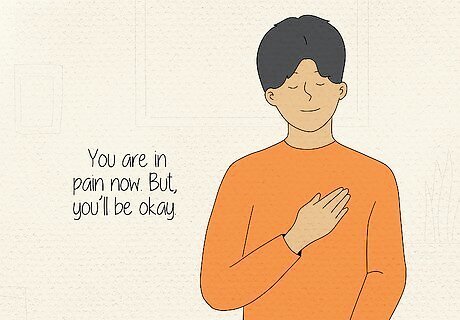
Practice self-compassion. You set the standard for how others should treat you by having a positive relationship with yourself. Perhaps others discount your positive qualities or treat you unfairly. But, this doesn’t not have to be how you see yourself. Begin to see yourself as worthy of fair treatment by treating yourself with compassion. Self-compassion means recognizing when you are feeling negative and being gentle on yourself. Remind yourself that you are only human. Give yourself a hug or soft caress. Say soothing phrases like “There, there” or “You are in pain now. But, you’ll be okay.”

Pursue your goals and dreams. If you have been struggling with fear, self-doubt, or a sense of obligation to do other things, then you may have put some of your goals and dreams on hold. To start building your sense of self-worth, it is important to make your goals and dreams a priority. Start taking steps towards achieving a goal or dream that you have. Make sure to set achievable goals, and divide your path towards them into small goals and step-by-step actions. For example, if your goal is to run a 5k, then start a training program to help you get ready for it. If your goal is to earn a college degree, then fill out an application (or a few) for schools and programs that interest you.

Consult with a mental health therapist. Anxiety and depression are common in scapegoats. It can be challenging to promote a positive self-esteem when you have been stuck in this role for most of your life. Reach out to a counselor or therapist who can help you overcome the victim role and recognize your untapped potential. You might work with a therapist individually and/or with others to stop scapegoating behaviors.

Join a support group. Search for support groups in your area or online for people in dysfunctional families or relationships. It’s likely that others in these groups will have taken on the scapegoat role. Sharing your feelings and concerns with the group may offer some release. You may also hear about effective strategies for developing your identity so that you are no longer such an easy target for scapegoating.
Handling Toxic Relationships

Seek out positive, supportive relationships. You can counteract the negative impact of being a scapegoat by cultivating healthy relationships. Plus, when you spend time around people who treat you fairly, you will stop accepting anything less. Don't be afraid to connect with and confide in these people when you're struggling. Identify the relationships in your life in which you feel valued, encouraged, and supported. Make an effort to enrich these relationships by showing appreciation for these people and dedicating more of your time to them. Make new friendships through support groups, professional organizations, or interest groups in your community. Lean towards people who appear emotionally healthy and don’t blame you for their problems. Keep in mind that it is possible that you do not know what a healthy relationship looks like. This may be something that you will need to work on and a therapist can help you to develop the ability to recognize healthy relationships.
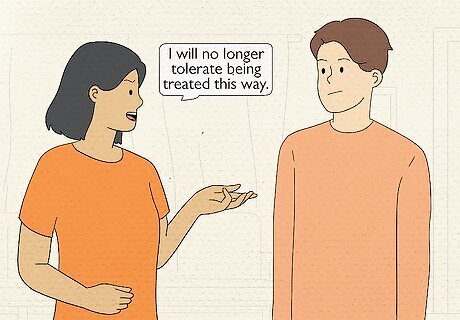
Set personal boundaries. Boundaries are the limitations where one person ends and another begins. In scapegoating relationships, these lines are all blurred. Stop allowing yourself to be scapegoated by setting firm boundaries. Assess what exactly makes the relationship negative, and have an open conversation with the person. For instance, you might say to your business partner, “I will no longer tolerate being treated this way. If you want to continue having me as a partner, you will need to stop blaming me for the business failing.”
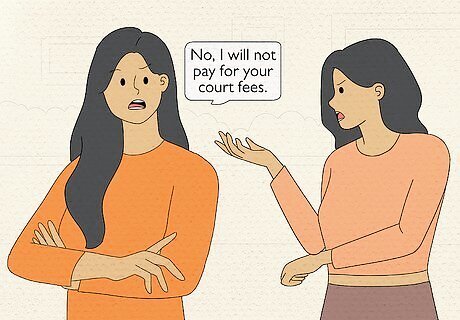
Speak up for yourself when you are scapegoated. When your boundaries are violated and others try to put you back in the scapegoat role, speak out. Show them that you are unwilling to be the scapegoat by reasserting your boundaries. You might say to your scapegoating sibling, “No, I will not pay for your court fees. I told you that I will not be held responsible for your financial troubles.” Keep in mind that after changing your boundaries, people will likely test your boundaries. They may try hard to make you give in, but it is important to hold firm in your boundaries.

Get distance from toxic people. Sometimes it is just impossible to make the relationship work. If others refuses to respect your boundaries, you may have to make the tough choice to cut ties. Decide whether it is best to minimize contact or cut contact completely with the offenders. Estrangement is a painful reality, but it may be necessary to help yourself get unstuck from the role of scapegoat. If the scapegoating happens in your family, you might cut ties. If it’s happening at your job, you might try to switch departments or transfer to a new employer. Work with your therapist to decide the best route for handling family members, partners or close friends who insist on blaming you.
Releasing Guilt and Pain

Acknowledge your emotional pain. Being the scapegoat to others can translate to being the victim of emotional bullying. Years of being picked on and manipulated by others has likely shifted your identity of who you are as a person. In order to stop being an easy target, you must admit to what’s happening and acknowledge the pain it causes. For instance, being the scapegoat may have caused you to experience anxiety, depression, self-doubt, relationship turmoil, and even addiction. Think about the true impact being the scapegoat has on your life by identifying who has used you as a scapegoat and why these people are important in your life and for your sense of self-worth. Be honest with yourself about the negative consequences. It may help to journal about it. Cry, if you need to. Or, lean on a supportive friend.
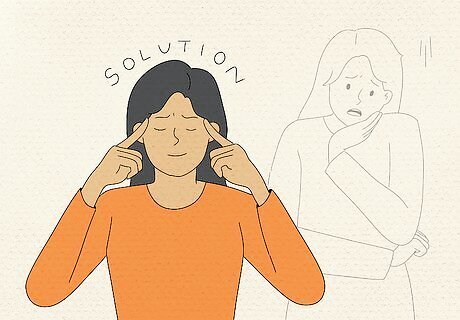
Reduce victim mentality. As hard as it may be to swallow, you have to accept that you are being scapegoated by others because you allow yourself to be. A major step towards overcoming scapegoating is to stop playing into the victim mentality. Just because others are trying to make you the victim, you don’t have to see yourself as one. Consider what you may have been getting out of playing the role of a victim. For example, you might enjoy the attention, feelings of validation, sense of security, sympathy, and lowered expectations that come with playing the victim. Playing the victim also prevents you from having to take responsibility for your own actions in a situation. Develop a new story of who you are that doesn’t involve being a victim. For instance, when something negative happens in your life, resist the temptation to connect it to people not failing to support you. This takes the control away from you and gives it to them. Instead look for some aspect of the problem in which you had control and brainstorm a solution from there. You may also turn your attention to things you feel grateful for and people you can help. This may help you to feel more empowered.

Practice forgiveness through rituals. You are stuck in the scapegoat role because you are harboring negative feelings about others and yourself. Strive for forgiveness and you may be able to finally release the negative emotions that have been keeping you as the scapegoat. Forgiveness doesn’t mean you aren’t holding others responsible for scapegoating, but letting go of the pain so you can move on. You can forgive yourself and others through rituals, such as by writing a letter. You can write a letter forgiving yourself and/or others for what you have done. Then read the letter out loud to yourself a few times and hang onto the letter to review whenever you need to remind yourself of the forgiveness. Light a candle and do several minutes of deep breathing. Bring to mind the pain you feel from the scapegoating. Picture the sensations and feelings you have attached to being the scapegoat (e.g. shame, anger, guilt, resentment, etc.). Write down all the thoughts and feelings you have. Imagine the negativity falling away from you. Take several more deep breaths. Blow out the candle as a symbol of letting go of the negativity for good.




















Comments
0 comment